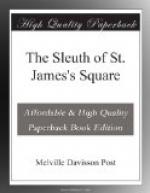My father stopped and caught up the hunchback’s double-barreled pistol out of the empty drawer.
The room was now illumined; the moon had got above the tree tops and its light slanted in through the long windows. The hunchback saw the thing and he paused; his face worked in the fantastic light.
“Yes,” continued my father, in his deep, quiet voice, “this is your mistake to-night — to let me get your weapon. Your mistake that other night was to shoot before you counted the money. It was only a few hundred dollars. The dozen wooden boxes would hold no great sum. But the thing was done, and you must cover it.”
He paused.
“And you did cover it — with fiendish cunning. It would not do for your brother to vanish from your house, alone and with no motive. But if he disappeared, with the gold to take him and a horse to ride, the explanation would have solid feet to go on. I give you credit here for the ingenuity of Satan. You managed the thing. You caused your brother David and the horse to vanish. I saw, on that morning, the tracks of the horse where you led him from the stable to the door, and his tracks where you led him, holding the dead man in the saddle, from the door to the ancient orchard where the grass grows over the fallen-down chimney of your grandsire’s house. And there, at your cunning, they wholly vanished.”
The mad courage in the hunchback got control, and he began to advance on my father with no weapon and with no hope to win. His fingers crooked, his body in a bow, his wizen, cruel face pallid in the ghostly light.
“Dillworth,” cried my father, in a great voice, like one who would startle a creature out of mania, “you will write a deed in your legal manner granting these lands to your brother’s child. And after that” — his words were like the blows of a hammer on an anvil — “I will give you until daybreak to vanish out of our sight and hearing — through the gap in the mountains into Maryland on your horse, as you say your brother David went, or into the abandoned cistern in the ancient orchard where he lies under the horse that you shot and tumbled in on his murdered body!”
The moon was now above the gable of the house. The candles were burned down. They guttered around the sheet of foolscap wet with the scrawls and splashes of Dillworth’s quill. My father stood at a window looking out, the girl in a flood of tears, relaxed and helpless, in the protection of his arm.
And far down the long turnpike, white like an expanded ribbon, the hunchback rode his great horse in a gallop, perched like a monkey, his knees doubled, his head bobbing, his loose body rolling in the saddle — while the black, distorted shadow that had followed my father into this tragic house went on before him like some infernal messenger convoying the rider to the Pit.




